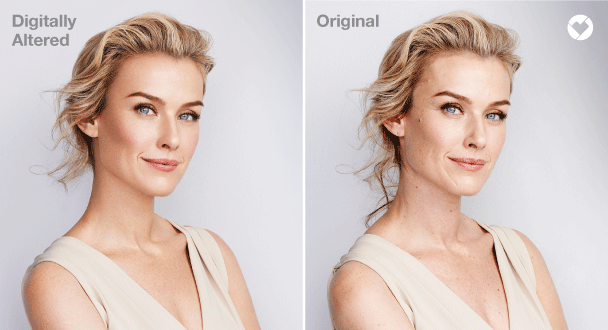CVS Health Monday said it will ban photo manipulation in its store-brand makeup marketing and promotional displays, a move that acknowledges growing awareness of the harmful nature of touched-up images.
The nation's largest drugstore chain will also require other makeup and beauty brands that sell products in its aisles to commit to a photo-manipulation ban by 2020, or face having an alert label placed on the images.
With some 9,600 stores nationwide, CVS is one of the nation's largest sellers of beauty products, giving the company significant influence over makeup marketing.
CVS Pharmacy President Helena Foulkes, who made the official announcement at the National Retail Federation's convention in New York, said the decision reflects an acknowledgment that "unrealistic body images" are "a significant driver of health issues," especially among women. About 80% of the chain's customers are women.
"We’re all consuming massive amounts of media every day and we’re not necessarily looking at imagery that is real and true," Foulkes said in an interview. "To try to hold ourselves up to be like those women is impossible because even those women don’t look like how they appear in those photographs."
The company's ban on image editing in its own beauty marketing, including store aisle displays and social media posts, is scheduled to take full effect by April 2019.
For other suppliers, the retailer will place an icon with a "digitally modified" warning message on any marketing materials that don't comply with CVS' new standard by 2020. The company's largest beauty product suppliers include Procter & Gamble, Johnson & Johnson, Unilever, L'Oreal, Maybelline and CoverGirl owner Coty.
Images and products that haven't been changed will get a new label called the CVS Beauty Mark.
"If someone decides they still need to digitally modify a photograph, what we want is for girls and women in our stores to know that," Foulkes said.
The move puts pressure on major CVS store makeup sellers to follow suit. Early indications suggest that makeup manufacturers may do so.
“Revlon and all of the brands in our company’s portfolio support CVS' mission to present positive and authentic images of women that reflect their individual characteristics and personal distinction," Revlon North America President John Collier said in an email.
Editing photos to improve women's appearance in beauty product marketing is "rampant" and "plagues our culture," said Jennifer Berger, executive director of San Francisco-based women's empowerment group About-Face.
"Look at any mascara ad and they’ll show a super-duper close-up of a woman’s face. No woman’s face looks like that," she said.
Foulkes said the company's suppliers had an "inspiring" response to the company's decision.
"I think they're thinking about it too because the world is changing fast, social media is changing things and there's a sense of empowerment among young girls that didn't exist when I was growing up," she said.
Here's how Foulkes said CVS is defining its commitment not to "materially" touch up any images: "We will not digitally alter or change a person's shape, size, proportion, skin or eye color, or enhance or alter their lines or wrinkles or other individual characteristics."
Body-image issues resulting from misleading imagery contributes to a health crisis of eating disorders among young women, Berger said.
Some 20 million women and 10 million men in the U.S. will have an eating disorder at some point, according to the National Eating Disorders Association.
"The culture has been just totally awash in these idealized images of women," Berger said. "It makes us ashamed of our appearance so companies can sell their products."
To be sure, there may also be a pragmatic element to the move by CVS.
Foulkes acknowledged that the company's makeup sales have been weak. In contrast, upstart makeup brands that have bet on natural ingredients and imagery are surging.
Those competitor brands have shown that authenticity in a world overwhelmed by false imagery is especially appealing to consumers.
"Partly we were reflecting on why are these indie brands doing so well," Foulkes said.


